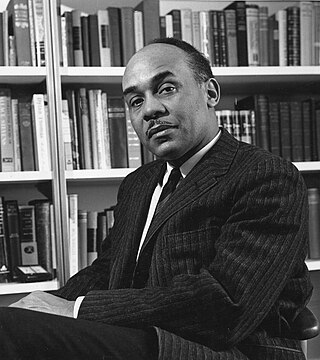
Ralph Waldo Ellison was an American writer, literary critic, and scholar best known for his novel Invisible Man, which won the National Book Award in 1953.

Richard Nathaniel Wright was an American author of novels, short stories, poems, and non-fiction. Much of his literature concerns racial themes, especially related to the plight of African Americans during the late 19th to mid 20th centuries suffering discrimination and violence. His best known works include the novella collection Uncle Tom's Children (1938), the novel Native Son (1940), and the memoir Black Boy (1945). Literary critics believe his work helped change race relations in the United States in the mid-20th century.

Native Son (1940) is a novel written by the American author Richard Wright. It tells the story of 20-year-old Bigger Thomas, a black youth living in utter poverty in a poor area on Chicago's South Side in the 1930s. Thomas accidentally kills a white woman at a time when racism is at its peak and he pays the price for it.

James Arthur Baldwin was an African American writer and civil rights activist who garnered acclaim for his essays, novels, plays, and poems. His 1953 novel Go Tell It on the Mountain has been ranked by Time magazine as one of the top 100 English-language novels. His 1955 essay collection Notes of a Native Son helped establish his reputation as a voice for human equality. Baldwin was an influential public figure and orator, especially during the civil rights movement in the United States.
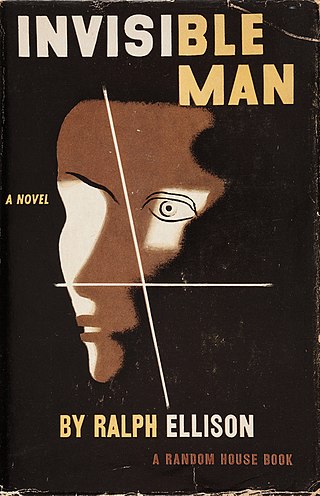
Invisible Man is Ralph Ellison's first novel, the only one published during his lifetime. It was published by Random House in 1952, and addresses many of the social and intellectual issues faced by African Americans in the early 20th century, including black nationalism, the relationship between black identity and Marxism, and the reformist racial policies of Booker T. Washington, as well as issues of individuality and personal identity.

Hawaii is a 1966 American epic drama film directed by George Roy Hill. It is based on the eponymous 1959 novel by James A. Michener. It tells the story of an 1820s Yale University divinity student who, accompanied by his new bride, becomes a Calvinist missionary in the Hawaiian Islands. It was filmed at Old Sturbridge Village, in Sturbridge, Massachusetts, and on the islands of Kauai and Oahu in Hawaii.

Agatha is a 1979 British drama thriller film directed by Michael Apted and starring Vanessa Redgrave, Dustin Hoffman and Timothy Dalton. It was written by Kathleen Tynan. The film focuses on renowned crime writer Agatha Christie's famous 11-day disappearance in 1926. The film was released 9 February 1979, receiving generally positive reviews from critics, who praised the production values and performances.
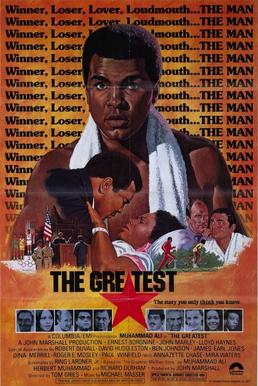
The Greatest is a 1977 biographical sports film about the life of boxer Muhammad Ali, in which Ali plays himself. It was directed by Tom Gries. The film follows Ali's life from the 1960 Summer Olympics to his regaining the heavyweight crown from George Foreman in their famous "Rumble in the Jungle" fight in 1974. The film consists largely of archival footage of Ali's boxing matches used in the screenplay.

The Adventure of Sherlock Holmes' Smarter Brother is a 1975 American musical comedy film with Gene Wilder, Marty Feldman, Madeline Kahn, Dom DeLuise, Roy Kinnear, and Leo McKern. The film was Wilder's directorial debut, from his own original script.

The Fury is a 1978 American supernatural horror thriller film directed by Brian De Palma and starring Kirk Douglas, John Cassavetes, Amy Irving, Carrie Snodgress, Charles Durning, and Andrew Stevens. The screenplay by John Farris was based on his 1976 novel of the same name.

Percival Leonard Everett II is an American writer and Distinguished Professor of English at the University of Southern California. He has described himself as "pathologically ironic" and has played around with numerous genres such as western fiction, mysteries, thrillers, satire and philosophical fiction. His books are often satirical, aimed at exploring race and identity issues in the United States.

Someone to Watch Over Me is a 1987 American neo-noir romantic thriller film directed by Ridley Scott and written by Howard Franklin. It stars Tom Berenger as a police detective who has to protect a wealthy woman, who is a key witness in a murder trial. The film's soundtrack includes the George and Ira Gershwin song from which the film takes its title, recorded by Sting, and Vangelis' "Memories of Green", originally from Scott's Blade Runner (1982).
Penelope Gilliatt was an English novelist, short story writer, screenwriter, and film critic. As one of the main film critics for The New Yorker magazine in the 1960s and 1970s, Gilliatt was known for her detailed descriptions and evocative reviews. A writer of short stories, novels, non-fiction books, and screenplays, Gilliatt was nominated for an Academy Award for Best Original Screenplay for Sunday Bloody Sunday (1971).
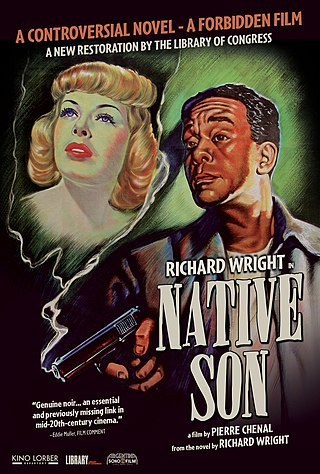
Native Son, also known as Sangre negra, is a 1951 Argentine black-and-white drama film directed by French filmmaker Pierre Chenal. It is based on the novel Native Son by American author Richard Wright, who also stars in the film and co-wrote the screenplay with Chenal. Actor Canada Lee, who was originally scheduled to play the film's protagonist Bigger Thomas, had difficulties with his visa while filming Cry, the Beloved Country (1951) in South Africa and had to decline the role; with the whole production in jeopardy due to the mishap, Wright decided to step in and replace Lee.

Edith's Diary (1977) is a psychological thriller novel by Patricia Highsmith, the seventeenth of her 22 novels. It was first published in the UK by Heinemann. One critic described it as "a relentless dissection of an unexceptional life that burns itself out from a lack of love and happiness".

The Cater Street Hangman is a crime novel by Anne Perry. It is the first in a series which features the husband-and-wife team of Thomas and Charlotte Pitt.
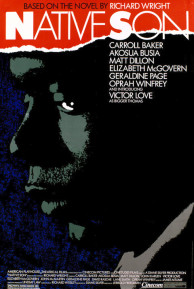
Native Son is a 1986 American drama film directed by Jerrold Freeman, and starring Carroll Baker, Victor Love, Matt Dillon and Oprah Winfrey. The film is based on the 1940 novel Native Son, written by Richard Wright.

Native Son is a 1941 Broadway drama written by Paul Green and Richard Wright based on Wright's novel Native Son. It was produced by Orson Welles and John Houseman with Bern Bernard as associate producer and directed by Welles with scenic design by John Morcom. It ran for 114 performances from March 24, 1941 to June 28, 1941 at the St. James Theatre.
Victor Love is an American actor, best known for the role of Bigger Thomas in the 1986 movie adaptation of the Richard Wright novel Native Son, for which he was nominated the Independent Spirit Award for Best Male Lead.

Native Son is a 2019 American drama film directed by Rashid Johnson from a screenplay by Suzan-Lori Parks. It is based on the novel of the same name by Richard Wright. The film stars Ashton Sanders, Margaret Qualley, Nick Robinson, KiKi Layne, Bill Camp and Sanaa Lathan.


















